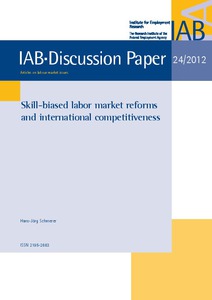Skill-biased labor market reforms and international competitiveness

Institut für Arbeitsmarkt- und Berufsforschung, Nürnberg
IAB - Nürnberg
2012
39 p.
labour cost ; labour market ; unemployment ; unskilled worker
IAB Discussion Paper
24
Labour market
English
Bibliogr.
"This paper proposes a multi-industry trade model with integrated capital and goods markets. Labor market imperfections in line with Mortensen and Pissarides (1994) give rise to unemployment and a channel for the government to influence markets through institutional changes. Labor market interventions feedback into the product market through changes in a country's competitiveness. Moreover, the distinction between high- and low-skill workers facilitates the analysis of skill-biased institutional changes that have stronger impact on certain skill groups. The comparative static exercise in this paper shows that high-skilled benefit from low-skill biased labor market reforms through higher wages. Lower labor costs reduce unemployment of the low-skilled and increases the reforming country's competitiveness. One-sided labor market interventions have feedback effects through adjustments at the extensive margin, which affect all workers at home and abroad irrespective of their level of skill. Governments in the non-reforming countries may react to this loss in competitiveness by initiating cooperative labor market reforms instead."
Digital
The ETUI is co-funded by the European Union. Views and opinions expressed are however those of the author(s) only and do not necessarily reflect those of the European Union or the ETUI.